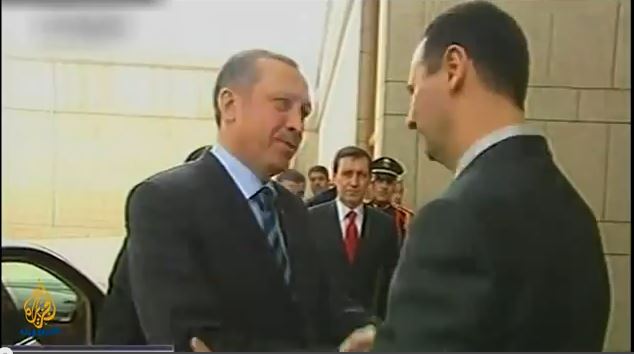 Once allies, now foes: Turkish PM Erdogan and Syrian President Assad. (Al-Jazeera)
Once allies, now foes: Turkish PM Erdogan and Syrian President Assad. (Al-Jazeera)
Estimation and outlook on the situation in Syria and the region – Part 3
Assad does not need to negotiate
Questions arise why Syrian President Bashar al-Assad does not want to negotiate with the opposition and is so adamant. Our reading is simple: Given the odds he was facing since two years, his stance did work relatively well for him, and now he does not have to negotiate anymore seriously, though he might send representatives to a future conference.
The strategic balance in Syria is shifting significantly to his side, and outside powers are becoming even more reluctant to hinder him go after his foes.
International tacit agreement
There seems to be a regional and international tacit agreement in place, to let him finish off his adversaries. That was for sure not the desired outcome at the start of the war, but serves all players better since the scenario of an Iraqi or Somali situation is looming, and nobody wants that.
Furthermore, a huge human catastrophe is playing out in Syria and among Syrian refugees in neighbouring countries. No force on earth will be able to fix that, once the Syrian state and thus its institutions will come to a halt and stop existing all over when rivalling fractions begin to battle for power and – in the course of that – destroy logistics and records of the central government.
Supply routes closing for the FSA
The Free Syrian Army receives a good part of its supply from Turkey. Syria´s northern border runs for its big part along Turkish territory.
Turkish Prime Minister Recep Tayyip Erdogan did push for regime change in Syria since the conflict broke out two years ago. Now, domestic policy and constraints are firing back on him. The deadly car bombing in the border town of Reyhanli that killed at least 43 people made voters openly question Turkey´s role in the conflict.
Reports of angry residents violently confronting Syrian refugees in the area are circulating. Erdogan blames his domestic press somewhat for the current situation in Syria and his own failure. Even outlets that are in favour of his government reject that notion. The Prime Minister is seriously getting angry that history does not take the course he had planned for.
Erdogan´s constraints and options
Erdogan is a people’s man from which he arose. He knows about the problems that could come to haunt him domestically if more such incidents like in Reyhanli were to happen.
But, he too, has limited choices. An intervention seems to be off the table and “armed, bearded Syrians flourish in southern Turkey”, as an author for the “Al-Monitor.com” publication wrote.
We think Erdogan will also opt for the safe card and slowly bring under control militants among Syrian refugees in his country and let supplies for the FSA run dry. The consequences are clear: The Syrian regime will root out one opposition nest after the other and consolidate its grip over the north.
Local oppositions left alone
Foreign-backed and military effective groups like the Nusra Front, according to our estimation, will pack their belongings and leave domestic opposition fighters to their fate, which – by all likelihood – will at least in the initial stages be very grim.
If Syrian President Bashar al-Assad shows wisdom he will instruct his soldiers to avoid bloody retribution. He could win over those, who can´t escape and may be ready to turn a page, thus adapting to the harsh, but inevitable realities.
This is an estimation of possible future developments that we anticipate. In the next part of this series we will be looking into the options of Iraq, Israel and Jordan.
